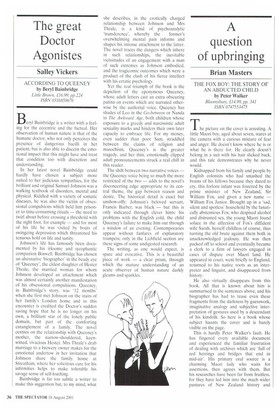The great Doctor Agonistes
Salley Vickers
ACCORDING TO QUEENEY by Beryl Bainbridge Little Brown. £16.99, pp.224 ISBN 0316858676
Beryl Bainbridge is a writer with a feeling for the eccentric and the factual. Her observation of human nature is that of the humane doctor, who not only perceives the presence of dangerous bacilli in her patient, but is also able to discern the emotional impact that this might have and treat that condition too with discretion and understanding.
In her latest novel Bainbridge could hardly have chosen a subject more suited to her judicious sympathies, for the brilliant and original Samuel Johnson was a walking textbook of disorders, mental and physical. Riddled with a variety of somatic diseases, he was also the victim of obsessional compulsions which held him prisoner to time-consuming rituals — the need to twirl about before crossing a threshold with the right foot, for example — and for most of his life he was visited by bouts of swingeing depression which threatened his tenuous hold on life and sanity.
Johnson's life has famously been documented by his irksome and sycophantic companion Boswell. Bainbridge has chosen an alternative 'biographer in the beady eye of `Queeney', the eldest daughter of Hester Thrale, the married woman for whom Johnson developed an attachment which was almost certainly another manifestation of his obsessional compulsions. Queeney, in Bainbridge's story, was '12 months' when she first met Johnson on the stairs of her family's London home and to this encounter is credited the Doctor's sudden saving hope that he is no longer on his own, a brilliant star of the lonely public domain, but part of the comforting entanglement of a family. The novel centres on the relationship with Queeney's mother, the narrow-shouldered, keenwitted. vivacious Hester. Mrs Thrale's drab marriage to a brewery owner makes for the emotional undertow in her invitation that Johnson share the family home at Streatham, where her solicitous care for his infirmities helps to make tolerable his savage sense of self-loathing.
Bainbridge is far too subtle a writer to make this suggestion but, to my mind, what she describes, in the erotically charged relationship between Johnson and Mrs Thrale, is a kind of psychoanalytic 'transference', whereby the former's overwhelming mental pain informs and shapes his intense attachment to the latter. The novel traces the dangers which inhere in such relationships, the inevitable vicissitudes of an engagement with a man of such extremes as Johnson embodied, and the tragicomic outcomes which were a product of the clash of his fierce intellect with his erratic psychology.
Yet the real triumph of the book is the depiction of the eponymous Queeney, whose adult letters cast an extra obscuring patina on events which are narrated otherwise by the authorial voice. Queeney has shades of Leo in the Go-between or Nanda in The Awkward Age, both children whose exposure to a greedy and narcissistic adult sexuality marks and hinders their own later capacity to embrace life. For my money, even sadder than poor Sam, straddled between the claims of religion and masochism, Queeney's is the greater tragedy, and her thin, emotionally clipped adult pronouncements struck a real chill in this reader.
The shift between two narrative voices — the Queeney voice being so much the more restricted of the two — adds to the novel's disconcerting edge appropriate to its central theme, the gap between reason and desire. The historical detail is exact but unshow-offy: Johnson's beloved servant, Francis Barber, was black — but this is only indicated through clever hints: his problems with the English cold, the child Queeney's failure to make him out through a window of an evening. Contemporaries appear without fanfares of explanatory trumpets; only in the Lichfield section are there signs of some undigested research.
The writing, as one would expect, is spare and evocative. This is a beautiful piece of work — a clear prism, through which the mature understanding of an acute observer of human nature darkly gleams and sparkles.


























































 Previous page
Previous page